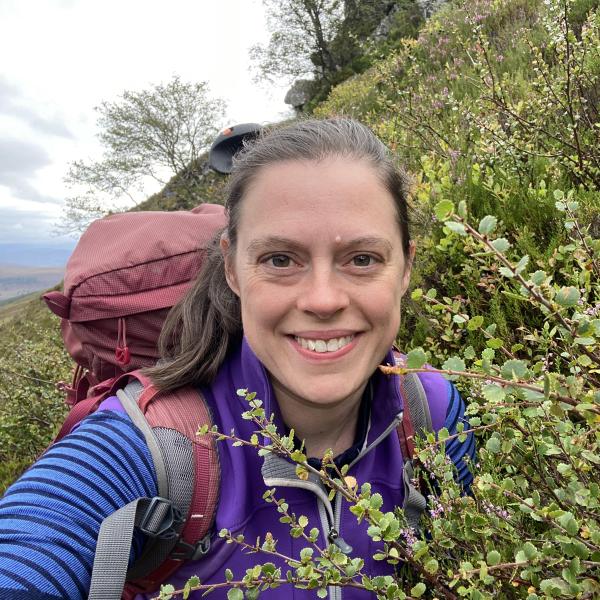Watch this video introducing my work on Restoring Scotland's mountain woodland Highly Commended for the Nature of Scotland Conservation Science award in 2023. The video was produced by Katrina Brown (Broon Coo Films/James Hutton Institute), with drone footage provided by the National Trust for Scotland.
I am a plant ecologist working at the interface between research and practice, specialising in upland vegetation, mountain woodland, restoration ecology, landscape-scale nature recovery, conservation management and applied science. Through studying population and community dynamics I am highly experienced in fieldwork, botany and biological recording, but also incorporate tools from a range of spatial and temporal scales from molecular genetics through to remote sensing and citizen science. I have also been Chair of the Mountain Woodland Action Group since 2021.
My PhD research and work as a conservation practitioner was recognised in the series Scotland’s Leaders in Biodiversity Conservation Science produced in the lead up to COP15.
PhD Project:
I am currently researching my part-time PhD “Improving outcomes in montane woodland restoration”. This project is aiding the development of conservation management techniques to restore healthy and sustainable upland tree and shrub populations in Britain. My work investigates the influence of abiotic and biotic environmental variables, habitat type and mycorrhizal associations on the survival, growth rates and natural regeneration of montane woodland and scrub. Outputs include recommendations to be incorporated into management plans and Best Practice guides for land managers and practitioners; contributing to ongoing efforts to facilitate the long-term resilience and expansion of the treeline ecotone across the country. My research therefore spans more than just one species or habitat type, but encompasses a range of plant communities supporting a flourishing mosaic with huge benefits for people and wildlife
The restoration of Scotland’s mountain woodland is vitally important for tackling climate breakdown and biodiversity loss. Having been degraded by centuries of overgrazing, burning and exploitation, these fragmented remnant habitats are some of the rarest in the country. The altitudinal treeline is a transition zone which hosts a unique assemblage of specialist upland invertebrates and birds, enriching overall landscape diversity. Mountain woodland also provides opportunities for natural hazard protection, sheltering, and downstream flood-risk reduction. My research demonstrates that such nature-based solutions are critically needed to combat escalating threats from soil erosion, flooding, warming temperatures and extreme weather.
Mountain woodland restoration mapping:
In 2023 I undertook an extensive country-wide mapping project for NatureScot to inform 30x30 targets, Nature Networks and the delivery of Scotland’s Biodiversity Strategy. I have mapped the distribution of all relict (wild) populations of montane trees, focusing particularly on threatened and scarce species. My project has also produced the first ever map of mountain woodland restoration sites throughout Scotland, covering a total of 9377 ha tree planting and natural regeneration areas, as well as 1466 ha approved for restoration management in the next few years. These outputs will form the foundation of opportunity mapping for upscaling mountain woodland restoration to foster wider habitat connectivity and address the nature and climate emergency at the national level.
Practice-led perspective:
A scientific approach is crucial to providing robust answers to key questions in ecology, but for me the real excitement and value comes in the applications. My greatest motivation for producing high quality research outputs is their impact on the delivery of practical, ‘on the ground’ action through my job as a conservation manager, aiding the decision-making processes and challenges that end-users such as myself face day to day. In addition to undertaking my PhD, I also work part-time at Corrour, a 23,000 ha Highland estate in Lochaber. Here we are implementing landscape-scale habitat restoration and nature recovery for a range of ecosystems and species including peatlands, montane willow scrub, tall herbs, dragonfly conservation, riparian woodland and upland woodland regeneration.
Citizen science is also a key aspect of my research through enhancing the biological recording of high-altitude trees and other plants in collaboration with the Botanical Society of Britain and Ireland. My #HighMountainTrees public engagement campaign has recently led to 11 new altitudinal records for tree species in Britain; expanding our knowledge of the environmental tolerances of plants and promoting mountain woodland restoration through extensive media and news coverage and a publication in The Conversation.
Arctic-alpine plants and climate change:
As well as studying montane trees, I have also monitored some of Scotland’s rarest plants on Ben Lawers National Nature Reserve alongside National Trust for Scotland staff and volunteers - culminating in a long-term study of arctic-alpine flora under threat from climate change. One species, snow pearlwort (Sagina nivalis), has declined by 66% since the mid-1990s and, as a direct result of our work, has had its UK conservation status changed from ‘Vulnerable’ to ‘Endangered’. Such low-latitude arctic-alpine plant populations, already situated at maximum local elevations, are effectively on an ‘elevator to extinction’: there is no higher ground for them to retreat to as temperatures continue to rise. As published in The Conversation, our research demonstrates the need to focus on biodiversity loss in important groups such as small vascular plants, bryophytes, lichens, invertebrates and fungi, as well as the charismatic large mammals and birds.
Funding:
My PhD research is supported by funding from the Woodland Trust, Corrour Estate, Scottish Forestry Trust, National Trust for Scotland, Forest Research, Future Woodlands Scotland, Macaulay Development Trust and University of Stirling.

